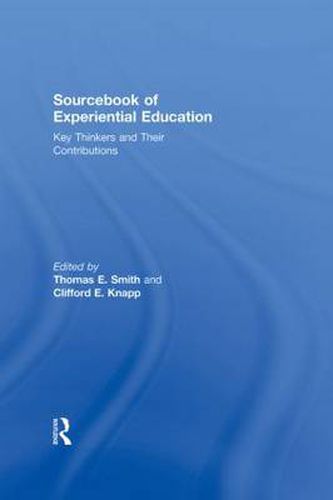Readings Newsletter
Become a Readings Member to make your shopping experience even easier.
Sign in or sign up for free!
You’re not far away from qualifying for FREE standard shipping within Australia
You’ve qualified for FREE standard shipping within Australia
The cart is loading…






Experiential education is a philosophy and methodology for building knowledge, developing skills, and clarifying values by engaging learners in direct experience and focused reflection. To understand experiential education, what should one be reading? This sourcebook introduces philosophers, educators, and other practitioners whose work is relevant to anyone seeking answers to this question. Following brief snapshots of John Dewey and Kurt Hahn, the book is organized in four sections: Philosophers and Educational Theorists Nature Educators and Outdoor Educators Psychologists and Sociologists School and Program Founders. Each chapter focuses on an individual whose philosophy and practice exemplify a biographical and historical model for reaching a deeper understanding of experiential education. An appendix includes short biographical sketches of forty-five additional people whose contributions to experiential education deserve a closer look. This volume provides a much-needed overview and foundations for the field – for students in courses addressing experiential education, challenge education, outdoor experiential education, recreation education, and related fields; for learning theorists and curriculum specialists; for experiential educators; and for educational philosophers.
$9.00 standard shipping within Australia
FREE standard shipping within Australia for orders over $100.00
Express & International shipping calculated at checkout
Stock availability can be subject to change without notice. We recommend calling the shop or contacting our online team to check availability of low stock items. Please see our Shopping Online page for more details.
Experiential education is a philosophy and methodology for building knowledge, developing skills, and clarifying values by engaging learners in direct experience and focused reflection. To understand experiential education, what should one be reading? This sourcebook introduces philosophers, educators, and other practitioners whose work is relevant to anyone seeking answers to this question. Following brief snapshots of John Dewey and Kurt Hahn, the book is organized in four sections: Philosophers and Educational Theorists Nature Educators and Outdoor Educators Psychologists and Sociologists School and Program Founders. Each chapter focuses on an individual whose philosophy and practice exemplify a biographical and historical model for reaching a deeper understanding of experiential education. An appendix includes short biographical sketches of forty-five additional people whose contributions to experiential education deserve a closer look. This volume provides a much-needed overview and foundations for the field – for students in courses addressing experiential education, challenge education, outdoor experiential education, recreation education, and related fields; for learning theorists and curriculum specialists; for experiential educators; and for educational philosophers.